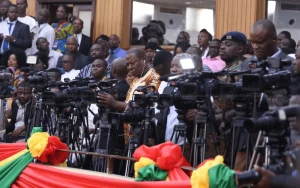The Electoral Commission (EC) has reversed its earlier directive restricting media access to constituency and regional collation centres.
This means all media houses will allow media personnel greater access during the electoral process.
In a statement issued on Monday, December 2, the EC announced that after internal discussions and consultations with key media stakeholders, media professionals with photo accreditation to cover polling stations will now be permitted to use the same accreditation to access constituency and regional collation centres.
“From Saturday, 7th December 2024, media persons can access Constituency and Regional Collation Centres using their photo accreditation cards issued by the EC,” the statement read.
The EC reiterated its commitment to transparency and accountability, emphasizing that the revised accreditation system is designed to ensure greater access and flexibility for media professionals during the elections. The decision has been welcomed by media practitioners as a significant step toward fostering openness in the electoral process.
It would be recalled that the Electoral Commission in a memo dated November 25, 2024, said, among others, that eight media organisations would be accredited to cover collation activities in the constituencies.
The EC’s U-turn comes after facing massive criticism from the media, civil society organizations (CSOs), and the general public. The United Press for Development Network (UPDN) also expressed grave concern in a statement regarding the Electoral Commission (EC) of Ghana’s media accreditation process for the upcoming 2024 elections.
The initial memo proposed a drastic limitation on the number of journalists allowed access to constituency and regional collation centers, citing space constraints. After consultations with key media associations, such as the Ghana Journalists Association (GJA) and the Ghana Independent Broadcasters Association (GIBA), the number of accredited journalists was increased from 3,308 to 4,500.
However, the UPDN argued that this adjustment is insufficient and fails to address the fundamental issue of restricting media coverage during the elections.






